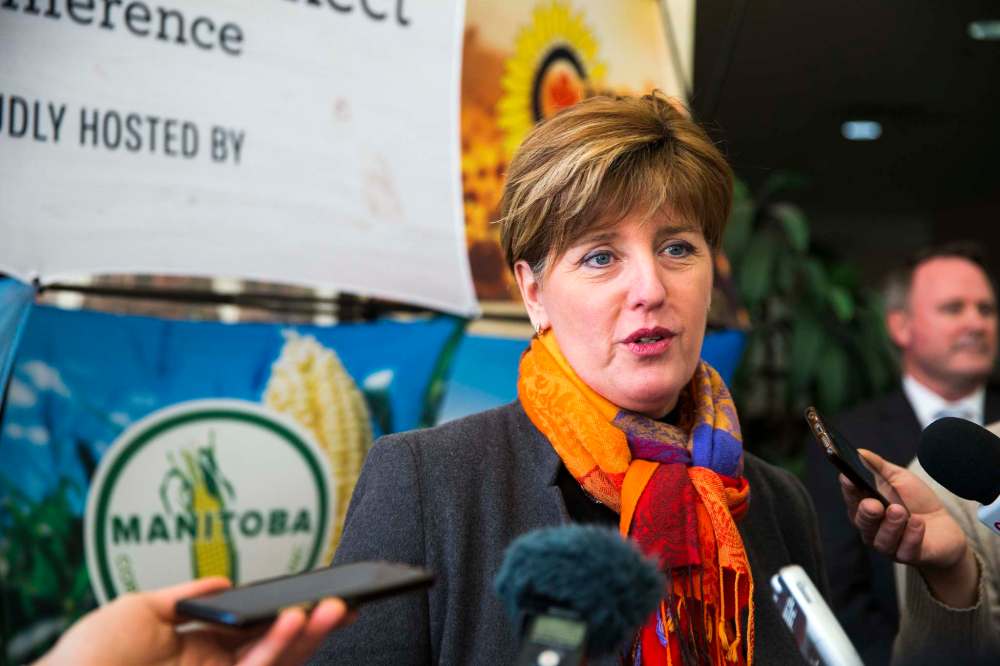Grain-drying figures in the works
Prairie provinces oppose carbon tax being levied on practice
Advertisement
Read this article for free:
or
Already have an account? Log in here »
To continue reading, please subscribe:
Monthly Digital Subscription
$0 for the first 4 weeks*
- Enjoy unlimited reading on winnipegfreepress.com
- Read the E-Edition, our digital replica newspaper
- Access News Break, our award-winning app
- Play interactive puzzles
*No charge for 4 weeks then price increases to the regular rate of $19.00 plus GST every four weeks. Offer available to new and qualified returning subscribers only. Cancel any time.
Monthly Digital Subscription
$4.75/week*
- Enjoy unlimited reading on winnipegfreepress.com
- Read the E-Edition, our digital replica newspaper
- Access News Break, our award-winning app
- Play interactive puzzles
*Billed as $19 plus GST every four weeks. Cancel any time.
To continue reading, please subscribe:
Add Free Press access to your Brandon Sun subscription for only an additional
$1 for the first 4 weeks*
*Your next subscription payment will increase by $1.00 and you will be charged $16.99 plus GST for four weeks. After four weeks, your payment will increase to $23.99 plus GST every four weeks.
Read unlimited articles for free today:
or
Already have an account? Log in here »
Hey there, time traveller!
This article was published 20/02/2020 (2122 days ago), so information in it may no longer be current.
OTTAWA — Two months after pledging to tell the federal Liberals how much the carbon tax cost grain farmers last fall, Manitoba is still gathering its data.
On Dec. 17, 2019, agriculture ministers from the Prairie provinces agreed to tally and send Ottawa data on how much the federal carbon tax added to farmers’ costs that year, specifically for drying grain.
The Alberta government said Thursday it’s estimated that cost at $2.7 million in that province this past year.

Grain drying is one of the few agricultural tasks subject to the federal levy. Fuel used for agriculture is generally exempt from the carbon tax, because there are few environmentally friendly alternatives.
Officials decided it would be counterproductive to apply the tax in cases where customers would likely shift to cheaper foreign products, resulting in a minimal reduction of carbon emissions.
Prairie farmers have asked Ottawa to exempt those measures, and compensate them for added costs, which Keystone Agricultural Producers believes could amount to millions in Manitoba.
Instead, Ottawa has asked for provinces to tally up the cost.
“I’ve received interesting information from some provinces, and some associations as well,” federal Agriculture Minister Marie-Claude Bibeau told the Free Press on Wednesday.
Bibeau didn’t list who has sent her data, but said the Manitoba government is among those from whom she’s waiting on figures.
“I’m working on it right now, and their data are helpful,” Bibeau said.
The Manitoba government said last week that drying grain in 2019 likely cost farmers from $25 to $40 million, though it didn’t know how much of it went to the carbon tax.
The province didn’t provide an update Thursday, and wouldn’t specify the steps it’s taking to collect this data.
The Agricultural Producers Association of Saskatchewan, an industry group, has come up with an estimated hit on farmers by percentage, though it has no ballpark for the cumulative cost on that province last year.
The organization estimates the carbon tax on grain drying will cost a 5,000-acre farm $1,802 this year and almost $4,000 in two years.
Spokesman Duane Haave suspects that will mean millions of dollars for his province this year, but says that amount can only be extrapolated when yields and moisture are tabulated at the end of the year.
“We’re trying to demonstrate that there are numbers that show that it’s a problem,” he said. “It’s a significant amount of money.”
His organization argues that cumulatively, the carbon tax charges on things such as heating and trucking will take up eight per cent of Saskatchewan farmers’ net income this year, and 12 per cent in two years.
That amount would likely be different in Manitoba, because Saskatchewan relies heavily on coal and pays much more carbon tax than hydro-powered Manitoba.
The Saskatchewan government says it has shared some information with federal officials, but didn’t have any data to make public.
“The cost on individual farms will depend on the amount of grain that had to be dried and how much it needed to be dried,” wrote spokeswoman Megan Burns.
“Poor harvest conditions have forced many farmers to dry their grain from the 2019 growing season and the carbon tax has increased the costs.”
Meanwhile, the Alberta government provided its estimates to the Free Press, which added up to $2.7 million this year and would be $6.8 million under the 2022 rate.
“A fully implemented carbon price at $50 a tonne would cost our farmers about $7 million dollars for natural gas and propane, just on grain drying alone in Alberta,” wrote Adrienne South, spokeswoman for Alberta agriculture minister Devin Dreeshen.
“A carbon tax hurts the entire agriculture sector.”
KAP is tabulating the Manitoba data it has collected. It said this month that corn farmers alone have paid roughly $1.7 million in carbon tax for grain-drying during this harvest.
dylan.robertson@freepress.mb.ca


